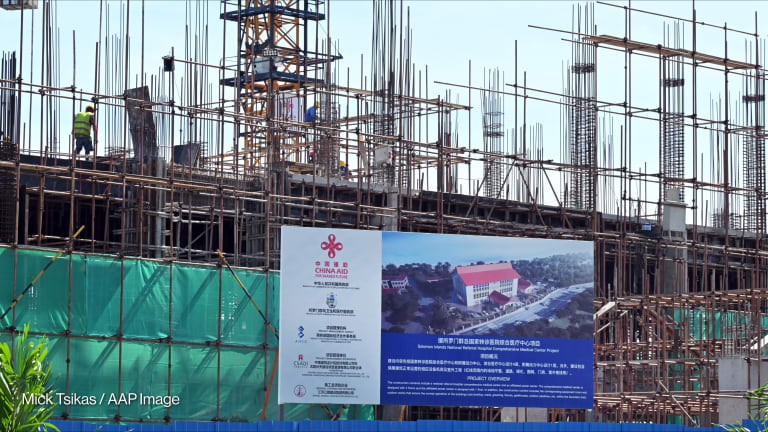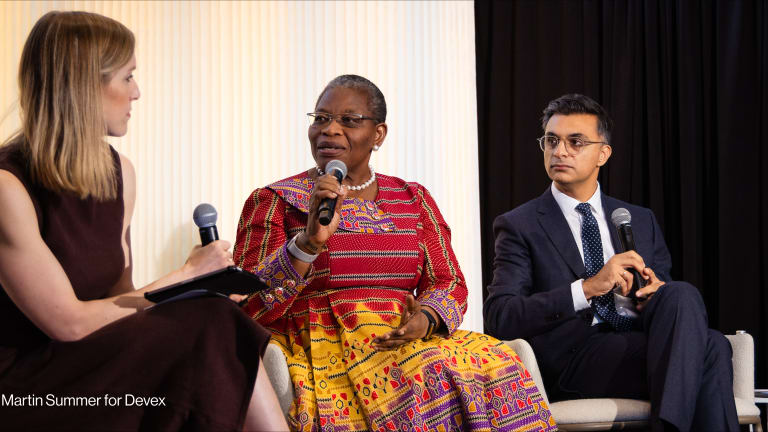
WASHINGTON — In its first five years, loan commitments by China’s Belt and Road Initiative surpassed combined lending by the World Bank Group, Asian Development Bank, African Development Bank, and the Inter-American Development Bank in a similar period, according to a new report.
BRI, which now includes some 132 countries, up from 65 at its start, committed or dispersed between $580 billion and $600 billion in loans between 2013 and 2018, outstripping the $490 billion lent by the group of multilateral development banks between 2013 and 2017, said the report from the Emerging Markets Forum.
“President Xi made very clear we want to really support a high-quality BRI … more will be done to ensure quality infrastructure and encourage Chinese companies and banks to adopt internationally accepted standards, including environmental and social.”
— Wencai Zhang, the director general of the Chinese Ministry of Finance’s Department of International Economic and Financial CooperationBased on the numbers alone, that gives BRI a significant potential impact. But what seems clear is that Beijing doesn’t want it to be seen as a purely Chinese initiative.
“BRI has become an international public good,” Wencai Zhang, the director general of the Chinese Ministry of Finance’s Department of International Economic and Financial Cooperation, said at the Emerging Markets Forum 2019 global meeting. Zhang added that BRI has strong support, with many countries signing cooperation agreements or memorandums of understanding. “It is not just a south-south cooperation initiative between China and developing countries, it is a global initiative,” Zhang said.
Not all experts, and not everyone listening to the remarks, necessarily agreed, several people questioned Zhang about the purpose of the BRI, how it could be considered a global public good and what changes the Chinese government plans to make with the initiative.
Some critics expressed concerns that countries in need of infrastructure upgrades and development that want to do so in line with international standards and sustainability in mind have not always found in possible to work with Chinese institutions.
The rise of Chinese aid
► A year on, CIDCA struggles to get off the ground
► Will the World Bank push China's Belt and Road Initiative in the right direction?
Some offered recommendations, including suggesting that Chinese institutions, particularly banks, strengthen institutional capacity and adhere to international standards. They also called on Chinese companies to improve the quality of their work, and the technology used in projects abroad and to shift to a long term focus on the success of a project — all factors that would make them more competitive with international financial institutions and other global companies.
Evolution of BRI
Zhang and others said that several announcements China made at the second Belt and Road Initiative Forum this spring are already addressing some of the concerns with BRI, including debt sustainability and a lack of adherence to international standards.
“President Xi made very clear we want to really support a high-quality BRI. In the coming days more will be done to ensure quality infrastructure and encourage Chinese companies and banks to adopt internationally accepted standards, including environmental and social,” Zhang said.
The minister of finance has already launched the debt sustainability framework with the help of the International Monetary Fund and the World Bank. Zhang recently spoke with the World Bank about supporting training for Chinese firms and banks on how to use the framework to do risk analysis and help countries concerned improve debt sustainability, he said.
Several of the report editors characterized the changes as a sort of evolution or maturing of the initiative. It is similar to how China approached its own development, letting a thousand flowers bloom and then reigning in and scaling the most promising approaches, said Johannes Linn, one of the report editors.
The recent announcements may also be the result of domestic pushback within China about why some much money is being invested internationally, in addition to global criticism, said Harinder Kohli, another report editor.
China is also launching the Multilateral Cooperation Center for Development Finance, which will have 10 international organizations as partners and have three mandates: capacity building, project preparation, and information sharing, Zhang said. Some skeptics Devex spoke to wondered if the center and the initiative would truly have consistent multilateral engagement.
One of the debates that emerged at the EMF meeting was around this issue of engagement and to what extent countries and institutions should work with BRI.
Q&A: The 'intellectual father' of BRI on China's global development approach
Devex Editor-in-Chief Raj Kumar sits down for a wide-ranging discussion with Justin Yifu Lin — one of the most influential thinkers in China on global development described as the "intellectual father" of the Belt and Road Initiative.
While the focus on BRI has often been a geopolitical discussion, and one focused on where the initiative may be falling short, there has been too little discussion about the potential gains for borrowing countries and their perspective has often been left out, Rajat Nag, a senior fellow at the Emerging Markets Forum, told Devex in an interview.
From the perspective of borrowing countries, such as Nepal, the reality is that China is putting up the money while “everyone else is lecturing” about how investments need to be different, he said, adding that those countries should “either put money up or shut up.”
But not all countries have that perspective. Some countries, including Georgia, have turned down BRI funding, or haven’t received much investment in part because what is being offered doesn’t meet the country’s standards.
There are some small countries in Central Asia and the South Caucasus that “fear they could lose sovereignty” to China, Linn said. There is a “justified, understandable” concern among experts that an economic dependency could develop, and countries could lose control of their assets and the ability to manage their economy — particularly in small countries where China has a heavy influence, having acquired considerable assets, he said.
“The room for independent maneuverability is getting narrow. It is a valid concern from the national perspective,” he said.

Report findings
The report, which focuses on the role of BRI in Central Asia and the South Caucasus, found that there are significant potential benefits for the region but also considerable constraints and risks. The region is in need of connectivity and investments to spur economic growth, but countries in the region have differing views of the initiative and different levels of engagement.
The challenges include a lack of alignment with national and regional plans, a lack of focus on operations and maintenance, a lack of investment in secondary and tertiary infrastructure, limited employment impact of skills transfer, concerns about the debt burden and a lack of transparency and the potential for mismanagement and corruption.
Among the recommendations in the report, the authors suggested that China and the international community have work to do to change policies to mitigate the challenges and realize the potential benefits. The report recommends that countries integrate BRI into their national plans and priorities, conduct rigorous cost-benefit analysis to ensure economic-financial, promote greater transparency, ensure competitive procurement and contracting and prioritize operations and maintenance of projects.
At the regional level, it recommended greater cooperation and integration, and said the region should leverage international financial institutions and partners in addition to creating a high-level platform to coordinate BRI. China, for its part, needs to open BRI to multilateral cooperation and implement the decisions announced at the second Belt and Road forum.
Countries in the region may have the best hope of holding China to account, particularly if it is slow in implementing some of its promises, by working through regional platforms, said Leo Zucker, one of the report editors.








